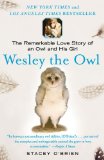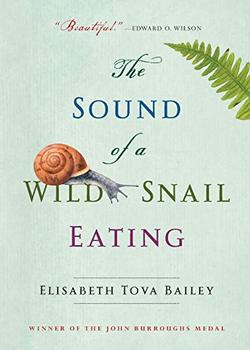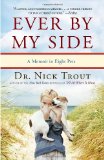Summary | Excerpt | Reading Guide | Reviews | Beyond the book | Read-Alikes | Genres & Themes | Author Bio

The Remarkable Love Story of an Owl and His Girl
by Stacey O'BrienO'Brien's story of her profound friendship with a barn owl is
strange, exciting, lovely and important. A much-needed corrective to our
sanitized, human-centric view of animals as instinct machines or as pets that can be
trained to perform stupid tricks, Wesley the Owl reasserts the powerful
and sometimes icky otherworldliness and breathtaking complexity of nature.
Prepare to be enlightened, disgusted, delighted and humbled.
O'Brien is a thoroughly
animal-oriented person. Her friends keeps goats, horses and dogs and spend their time studying
owls, vultures, or rotting sea mammal carcasses. She and her fellow biologists
pride themselves on their ability to suppress disgust and on their constant and
enthusiastic interest in the minutiae of nature. Describing her time working in
the owl labs at Caltech, O'Brien notes a biologist whose body has become a
permanent host for parasites he'd picked up in the Amazon while studying
monkeys. These Amazonian worms are always visible crawling under or breaking
through his skin. O'Brien describes another man whose study of spiders becomes
so obsessive that he begins taking black widows home and cooing over the spider
babies that he finds irresistibly cute.
All but a very few readers will gag at the thought of sharing one's body with
worms and will pity the man who has come to view spiders of any age as adorable,
but those who will enjoy Wesley the Owl the most will be those who
sympathize just a little with these extremists. You don't have to be an all-out
animal enthusiast to like this book, but you have to be interested in what
animals really do, and open to the idea that a person and an animal can enjoy a
deep and serious relationship.
I suspect that O'Brien includes these animal-obsessed eccentrics in her story to
let the reader know that she is not one of them, and to locate her relationship
with Wesley squarely within the bounds of the sane and the rational. In fact,
much of what O'Brien gives are objective and scientific descriptions of owl
behavior, physiology and psychology, beginning with her first observation of the
helpless four-day-old owl chick and culminating in a lovingly detailed
description of 19 year old Wesley's death in her arms. O'Brien's disciplined
objectivity is especially remarkable because her place in her owl's life is so
singular and their connection so deep and emotional. O'Brien is owl mother and
owl protector, owl playmate and owl soul mate, always working to insure that
Wesley will be as complete an owl as he can possibly be in captivity. O'Brien
becomes exquisitely attuned to Wesley's vocalizations and movements just as he
becomes attuned to her words and her habits.
While Wesley assumes a distinct and interesting personality and accomplishes
amazing acts of understanding (he eventually is able to measure the passage of
time and learns, for example, exactly what "two hours" means. He achieves an
understanding of many words and phrases including "you are handsome,"
"magazine," "water," "not for owls."), his instinctive, ordinary owl behaviors
are especially fascinating. A large part of the memoir is a record of Wesley's
grooming, feather structure, molting and growth, sleep habits, hearing, flight,
hunting and eating. I knew that owls ate mice, but only now do I understand how
they eat them, when they eat them, or what mice-parts they can digest. And
Wesley is not the only creature whose habits and behavior the reader follows:
O'Brien herself is always changing, sometimes to adapt herself to a new phase in
Wesley's development, or because of something new she's discovered about his
abilities or interests.
Wesley grows to love his caretaker – he attempts to feed her mice, to build her
a nest, and to protect her from men who appear to be his rivals— and O'Brien's
patient and respectful dedication to her owl deepens into great love. Wesley is
O'Brien's companion during illness and sad times, her inspiration, and her best
friend; caring for Wesley provides a reason to keep on living during her
bleakest depression, enlarges her sense of the possible, alters her values and
connects her deeply to nature.
Reading Wesley the Owl makes us look more closely and listen more
carefully to the creatures with whom we share the world, and reminds us of what
it takes and the rewards available to those who dedicate themselves wholly to
another. Young people interested in studying biology or who are curious about
owls after reading the Harry Potter series will discover through Wesley
that even ordinary barn owls are truly magical.
![]() This review was originally published in The BookBrowse Review in September 2008, and has been updated for the
June 2009 edition.
Click here to go to this issue.
This review was originally published in The BookBrowse Review in September 2008, and has been updated for the
June 2009 edition.
Click here to go to this issue.

If you liked Wesley the Owl, try these:

The Sound of a Wild Snail Eating
by Elisabeth Tova Bailey
Published 2016
In a work that beautifully demonstrates the rewards of closely observing nature, Elisabeth Bailey shares an inspiring and intimate story of her uncommon encounter with a Neohelix albolabris —a common woodland snail.

by Dr. Nick Trout
Published 2012
Tender, wry, and ruminative, Ever By My Side is a tribute to the power and beauty of ordinary life and a celebration of how pets make it all the sweeter and richer.
Talent hits a target no one else can hit; Genius hits a target no one else can see.
Click Here to find out who said this, as well as discovering other famous literary quotes!
Your guide toexceptional books
BookBrowse seeks out and recommends the best in contemporary fiction and nonfiction—books that not only engage and entertain but also deepen our understanding of ourselves and the world around us.